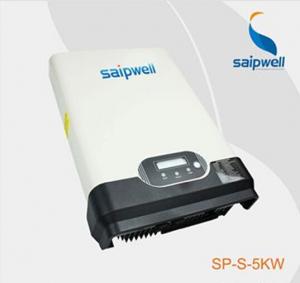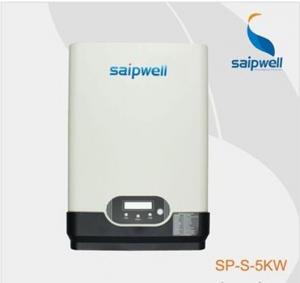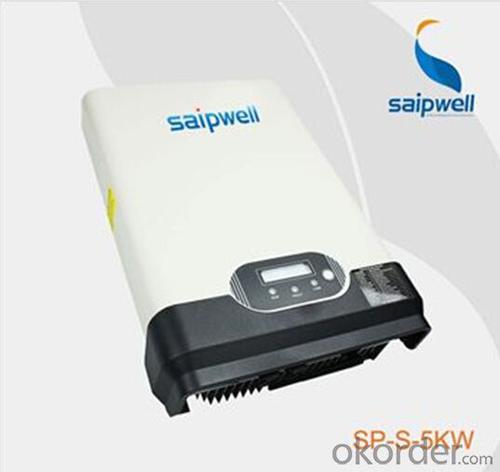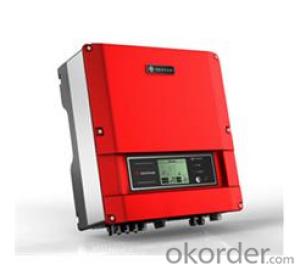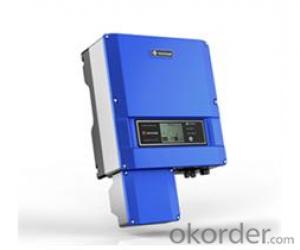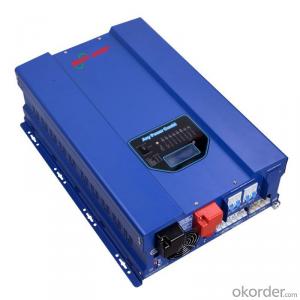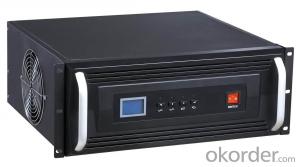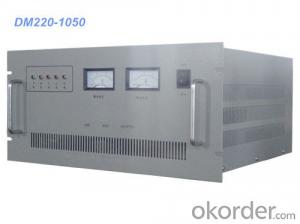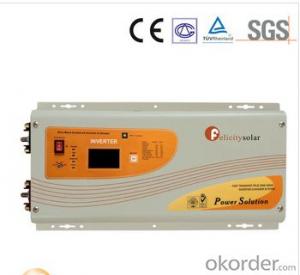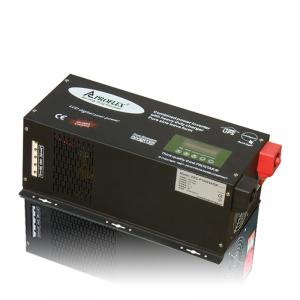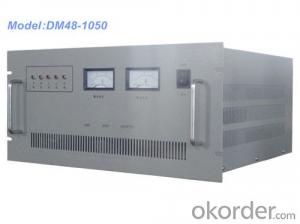10kVA Solar Inverter 5kW 220V 2024 Newest Pure Sine Wave
- Loading Port:
- China main port
- Payment Terms:
- TT or LC
- Min Order Qty:
- 5000 watt
- Supply Capability:
- 3000000 watt/month
OKorder Service Pledge
OKorder Financial Service
You Might Also Like
1. Structure of Solar Inverter 5kw 220v 2015 Newest Pure Sine Wave Description
The inverter series is an electronic product that has been designed and built to take low DC woltage power from batteries and convert it to
standard AC power like the current you have at home.
The Inverter series is a DC-to-AC with auto line-to-battery transfer and intergrated charging system. Inverter series powers from ACpower
and DC source, serving as an extended run UPS. When AC cable is connected to a wall socket, utility power goes to connected equipment
and/or charges the battery set via charging system. In Inverter mode, the Inverter series automatically converts battery energy into AC power
for backing up the connected devices
2. Main Features of Solar Inverter 5kw 220v 2015 Newest Pure Sine Wave
• Transformerless design, high efficiency (Max. 97.5%, Euro. 96.6%)
• High MPPT accuracy( >99.9%)
• Wide DC input range(120-590 Vdc), compatible with different module technologies
• Easy to wire, install and operate
• IP 65 design, suitable for indoor and outdoor installation
• 5 years warranty(10~25 years as option)
• Multi MPPT channels
3. Solar Inverter 5kw 220v 2015 Newest Pure Sine Wave Images
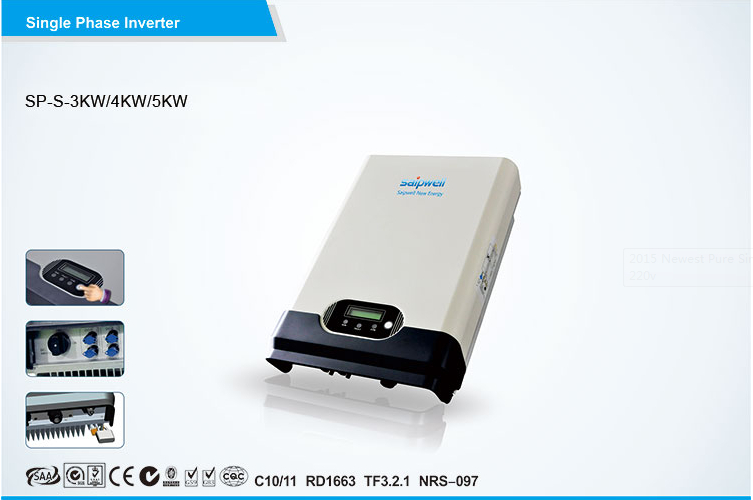
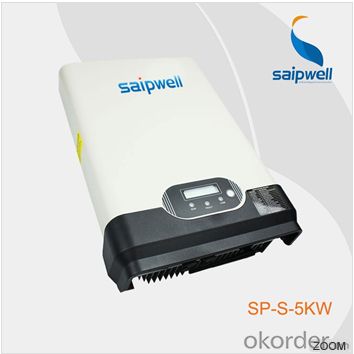
4. Solar Inverter 5kw 220v 2015 Newest Pure Sine Wave Specification
窗体顶端 Model窗体底端 | SP-S-3kw | SP-S-4kw | SP-S-5kw |
Input (DC) | |||
Max. DC voltage [V] | 590 | ||
MPPT DC voltage Range [V] | 120-500 | ||
Turn off DC voltage [V] | 120 | ||
Number of MPP Trackers | 2 | ||
Max. DC Current(A/B)[A] | 18/18 | ||
DC-Connection | MC4 | ||
Output (AC) | |||
Max. AC Power [W] | 3300 | 4400 | 4800 |
Nominal AC Power [W] | 3000 | 4000 | 4600 |
Max. AC Current [A] | 14.4 | 19 | 21.0 |
Nominal AC Current [A] | 13 | 17.4 | 20 |
Grid voltage Range | According to VDE 0126-1-1, RD1663, ENEL2010,C10/11,G83/1, AS4777 | ||
Grid Frequency Range | According to VDE 0126-1-1, RD1663, ENEL2010,C10/11,G83/1, AS4777 | ||
Power Factor | 0.99 (>30% of Full Load) | ||
THD(AC Output Current ) | <2% | ||
AC Connector | Plug-in connector | ||
Power Consumption | |||
Own Consumption in Operation [W] | 45 | 50 | 50 |
Power Consumption at Night [W] | 0 | ||
Power Consumption at Standby [W] | 6 | ||
Efficiency | |||
Max. Efficiency (at 360VDC) | 97.5% | 97.6% | 97.6% |
Euro. Efficiency (at 360VDC) | 96.6% | 97.0% | 97.0% |
MPPT Efficiency | 99.9% 窗体底端 | ||
5. FAQ of Solar Inverter 5kw 220v 2015 Newest Pure Sine Wave
Q1:Can we visit your factory?
A1:Sure,welcome at any time,seeing is believing.
Q2:Which payment terms can you accept?
A2:T/T,L/C,Moneygram,Paypal are available for us.
- Q: What is the maximum number of MPPT inputs in a solar inverter?
- The maximum number of MPPT inputs in a solar inverter can vary depending on the specific model and brand. However, in general, solar inverters can have anywhere from one to multiple MPPT inputs, with some high-end models offering up to six or more MPPT inputs.
- Q: How does a solar inverter handle variations in solar irradiation?
- A solar inverter handles variations in solar irradiation by continuously monitoring the amount of sunlight received from the solar panels. It adjusts its power output accordingly to convert the maximum available DC power from the panels into AC power for use in the electrical grid or home. This dynamic response ensures that the inverter optimizes energy production even during changing weather conditions or fluctuations in solar irradiation.
- Q: What are the different power output modes of a solar inverter?
- The different power output modes of a solar inverter include grid-tie mode, off-grid mode, and hybrid mode. In grid-tie mode, the inverter synchronizes with the utility grid and feeds excess solar power back to the grid. Off-grid mode allows the inverter to operate independently from the grid, providing power to a standalone system or battery storage. Hybrid mode combines both grid-tie and off-grid capabilities, enabling the inverter to utilize solar power while still being connected to the grid for backup or additional power supply.
- Q: Can a solar inverter be used with different solar panel technologies?
- Yes, a solar inverter can be used with different solar panel technologies as long as the inverter is compatible with the specific voltage and power output of the panels. However, it is important to ensure that the inverter is designed to handle the specific characteristics and requirements of each solar panel technology for optimal performance and efficiency.
- Q: Can a solar inverter be used in a commercial solar system?
- Yes, a solar inverter can be used in a commercial solar system. A solar inverter is an essential component of a solar system as it converts the direct current (DC) generated by the solar panels into alternating current (AC) that can be used to power commercial buildings and equipment.
- Q: What is the typical size and weight of a solar inverter?
- The typical size and weight of a solar inverter can vary depending on the capacity and type of the inverter. However, most residential solar inverters have dimensions ranging from around 12 x 8 x 5 inches and weigh between 20 to 40 pounds. Commercial or utility-scale inverters can be much larger and heavier, often weighing several hundred pounds and having larger dimensions.
- Q: Can a solar inverter be used with a time-of-use electricity tariff?
- Yes, a solar inverter can be used with a time-of-use electricity tariff. A solar inverter is responsible for converting the direct current (DC) energy produced by solar panels into alternating current (AC) electricity that can be used in homes or businesses. By connecting the solar inverter to a time-of-use electricity tariff, users can take advantage of different electricity rates at different times of the day. This allows them to maximize their solar energy consumption during off-peak hours when electricity rates are lower and minimize their consumption during peak hours when rates are higher.
- Q: Can a solar inverter be used in systems with different module types?
- Yes, a solar inverter can be used in systems with different module types. Solar inverters are designed to convert the direct current (DC) generated by the solar panels into alternating current (AC) that can be used to power various household appliances and be fed into the electrical grid. They are typically compatible with a wide range of module types, including monocrystalline, polycrystalline, and thin-film solar panels. However, it is important to ensure that the inverter's specifications and capacity align with the specific module types being used to ensure optimal performance and efficiency.
- Q: Are solar inverters compatible with smart home systems?
- Yes, solar inverters are compatible with smart home systems. In fact, many modern solar inverters are designed to integrate seamlessly with smart home technology, allowing homeowners to monitor and control their solar energy production and consumption through their smart devices. This integration enables better energy management, increased efficiency, and the ability to optimize the use of solar power within a smart home ecosystem.
- Q: Can a solar inverter be used with thin-film solar panels?
- Yes, a solar inverter can be used with thin-film solar panels. Thin-film solar panels have different characteristics than traditional crystalline panels, but they still generate DC power that needs to be converted into AC power for use in homes or businesses. Solar inverters are designed to convert the DC power from any type of solar panel, including thin-film, into usable AC power.
Send your message to us
10kVA Solar Inverter 5kW 220V 2024 Newest Pure Sine Wave
- Loading Port:
- China main port
- Payment Terms:
- TT or LC
- Min Order Qty:
- 5000 watt
- Supply Capability:
- 3000000 watt/month
OKorder Service Pledge
OKorder Financial Service
Similar products
Hot products
Hot Searches
Related keywords
